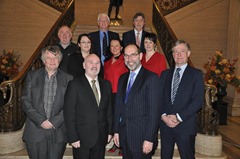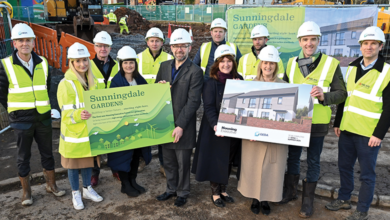Social Development Committee: progress report
 Peter Cheney reviews the Social Development Committee’s work since 2011, which has majored on welfare, housing and regeneration.
Peter Cheney reviews the Social Development Committee’s work since 2011, which has majored on welfare, housing and regeneration.
The term ‘social development’ is rarely used by members of the public but it is defined, in official and academic circles, as helping poorer people in society to improve their lives. Housing, social security and urban regeneration are the main parts of the Department for Social Development’s remit. It also oversees the regulation of charities, gambling and liquor licensing.
Unusually, the committee’s Chair and Deputy Chair are both from Sinn Féin: Alex Maskey and Mickey Brady respectively. Committee positions were decided between the parties after the May 2011 Assembly election.
Taking up his post, Maskey said: “There are complex and important issues to be addressed and it is our hope that a close working relationship between the committee and the Minister [Nelson McCausland] and his department will help us to achieve positive results for the community over the next four years.”
At present, though, relations between the Minister and most committee members are tense following last July’s BBC Spotlight programme. The allegations of political interference, potential breaches of the ministerial code, and misleading the Assembly form the basis for an extensive, ongoing committee inquiry. The terms of reference cover:
• decision-making relating to the award, modification and cancellation of maintenance contracts;
• allegations that the committee was misled by the Minister over his decision to seek a review of the specification for the supply and fitting of double glazing; and
• the adequacy of actions proposed by the Minister, his department and the Housing Executive to address previous, well-documented failings in relation to procurement and contract management (i.e. by Red Sky).
The inquiry began in October and is continuing. If is due to report back by the end of June. To date, it has taken evidence from JH Turkington, the Glass and Glazing Federation, departmental and Housing Executive officials, the Minister and his special adviser, Stephen Brimstone.
Aside from its end-of-year summaries, the committee has published eight substantive reports since the Assembly election. The first, in June 2011, dealt with a brief legislative consent motion about sharing information about tax credit claimants.
A Pensions Bill came before the committee early in 2012 and its report was published in March of that year. The Bill, which was enacted in June 2012, equalises the state pension age for men and women by November 2018 and increases that age to 66 by 2020. Employees will be automatically enrolled in a workplace pension and the consumer price index (rather than the retail price index) will measure inflation for indexation and revaluation of occupational pensions.
The committee highlighted the impact on women whose first state pension will be delayed by the equalisation process and the warned that the proposed state pension would fall below the officially stated poverty level. Members noted that people “may be living longer but not necessarily living healthier.”
The next report, in May 2012, focused on fuel poverty and expressed frustration that “little progress appears to have been made to prevent or reduce” the problem. Innovative thinking was needed to ‘bridge the gap’ between identifying solutions and putting them into practice. The elimination of fuel poverty would “require a long-term strategic policy approach” and “quick fixes” were “not the answer.”
The committee affirmed the campaigners’ view that 44 per cent figure of households were living in fuel poverty. University of Ulster research suggests that the real figure is 13 per cent.
It backed the work of “thematic action groups” which could work on delivering practical solutions.
A Charities Bill was also brought forward by the Minister, to amend the law on defining a charity. Legal opinion sought by the Charity Commission had suggested that this was unclear. In its report, published in October 2012, the committee was content with most of the clauses.
On a related note, the committee endorsed the Small Charitable Donations Bill which came before the Assembly for legislative consent in the following month. It allows charities and community amateur sports clubs to claim a gift aid-style payment on small cash donations up to £20.
Another piece of legislation – the Business Improvement Districts Bill – was reported on in December 2012. The committee heard that the views of residents living near a business improvement district may be ignored. It therefore called for residents to be represented on the board of the ‘BID company’ once it was established. This will be a matter for the organisation proposing the district.
The Welfare Reform Bill report (February 2013) has been the committee’s most significant publication. When taking oral evidence, the committee “became increasingly concerned about the potential impact of the Bill on human rights and equality.”
It therefore referred the Bill to a separate ad hoc committee to consider “human rights and equality requirements” which met between November 2012 and January 2013. That committee concluded that it “cannot identify any specific breaches of equality or human rights aspects of the Welfare Reform Bill.”
The Social Development Committee stated that it had “serious concerns about [the Bill’s] potential negative impact, particularly on vulnerable groups.” Its policy recommendations included:
• treating a person who is willing to sign a claimant commitment as a single claimant if their spouse or partner is unwilling to sign;
• paying universal credit twice monthly (rather than monthly) unless the claimants decide otherwise;
• maintaining eligibility for employment and support allowance for disabled young people;
• amending criteria for split payments to improve support for women and children;
• refusing to implement the under-occupancy penalty (bedroom tax);
• restoring the lower rate of child tax credit; and
• retaining the severe disability premium.
Its most recent report, in December, covered the Licensing of Pavement Cafés Bill which will introduce a mandatory licensing scheme for the regulation of pavement cafés. Disability charities warned that tables and chairs could create dangerous obstacles for disabled pedestrians. The department pledged that its guidance will “place particular emphasis” on the needs of pedestrians.
In its other work, the committee has called for more action on repossessions, visited regeneration schemes in Ballymena, Coleraine, Derry and Belfast, and urged members of the public to respond to the department’s consultation on welfare reform.
Membership
Chair: Alex Maskey (SF)
Deputy Chair: Mickey Brady (SF)
Jim Allister (TUV)
Paula Bradley (DUP)
Gregory Campbell (DUP)
Trevor Clarke (DUP)
Michael Copeland (UUP)
Stewart Dickson (Alliance)
Dolores Kelly (SDLP)
Fra McCann (SF)
Sammy Wilson (DUP)





